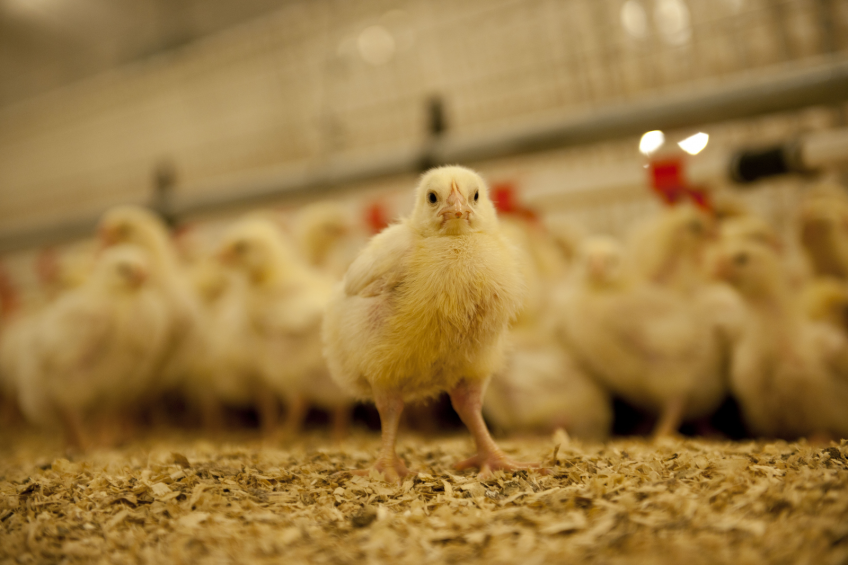Improve broiler performance with ‘Flexible Feed Formulation’

New research from Chr. Hansen confirms that a direct-fed microbial (DFM) for poultry containing a unique strain of Bacillus subtilis allows producers to reduce energy, protein and amino-acid content in feed, without reducing broiler performance. Improved performance on lower cost diets.
These findings — combined with Chr. Hansen’s 100+ years of experience in microbial product development — are the basis of the company’s new “Flexible Feed Formulation” concept, which was presented in a forum at the 2016 International Production and Processing Expo in Atlanta, Georgia, USA.
“Feed can account for up to 70% of the cost of broiler production, with energy, protein and amino acids representing some of the costliest components,” said Mickaël Rouault, global product manager for Chr. Hansen. “By boosting enzyme production while enhancing intestinal function, this B. subtilis strain is proven to increase both the availability and uptake of energy and nutrients. As a result, broilers can maintain performance on diets that are lower in energy, protein and amino acids — and consequently, lower in cost.”
Improved digestibility and performance
In several trials conducted under commercial conditions in the US and Brazil, a DFM containing a proprietary B. subtilis strain (GalliPro® Max) was shown to contribute 35 to 100 kcal/kg feed, depending on feed composition and flock-health conditions. That means dietary energy can be reduced by 1-3%, without compromising weight gain or feed conversion in commercial broilers. Further studies from Brazil and the UK showed that the DFM increases protein and amino acid digestibility, compensating for a 1-5% reduction in these potentially costly feed components.
According to Alfred Blanch, PhD, DVM, a poultry consultant for Chr. Hansen, results were consistent across the controlled studies, each of which evaluated the effect of the probiotic supplement on several different concentrations of dietary energy or protein. “Although actual energy and protein compensation can vary based on nutrition, environment and subclinical infections, this B. subtilis strain clearly and consistently improves broiler performance by helping them get more energy and nutrients from their feed,” he said.
Proven mode of action
The consistency of the study data reflects the proven mode of action of the B. subtilis strain used in the study, which works by increasing enzyme activity, while improving intestinal function. Using a proprietary tool known as reducing-sugar release (RSR) analysis, Chr. Hansen scientists demonstrated that by breaking down fibre and making more reducing sugars available to birds, the probiotic contributes 40 to 60 kcal/kg feed, confirming the trial results.
“B. subtilis enhances carbohydrate, protein and lipid metabolism by producing digestive enzymes that birds don’t produce on their own,” Rouault explained. “As our RSR analysis proves, this particular strain gives birds access to more metabolisable energy from their feed, which partly explains the increased digestibility and performance we observed in the in vivo studies.”
In addition to making more nutrients available to the bird, GalliPro® Max aids the uptake of nutrients by promoting healthy microbial diversity in the intestine. This not only allows birds’ natural digestive enzymes to work more effectively, but it also makes it more difficult for harmful bacteria to colonise the gut. Furthermore, the probiotic has been shown to increase villus length, thereby increasing the gut’s capacity for nutrient absorption.
More with less
According to Blanch, the ability to maintain broiler performance on energy- and protein-reduced feed has clear economic benefits for producers and nutritionists, but there are other benefits, too. “Lower-protein diets mean not only lower feed costs, but also less ammonia — a natural byproduct of protein digestion — resulting in better litter quality, fewer footpad lesions, better air quality in the poultry house and reduced ammonia emissions,” he explained.
In addition, the B. subtilis strain in GalliPro® Max has been shown to improve broiler weight-gain and feed conversion both with and without antibiotics, making it a valuable tool as the poultry industry comes under pressure to reduce antibiotic use.
“At its core, the Flexible Feed Formulation concept is about producing more with less — not just less energy, protein and money, but also less waste, less ammonia and potentially fewer antibiotics,” Rouault emphasized. “By using less, we believe the industry stands to gain much more in return: more profit, more sustainability and more successful poultry production overall.”
References available upon request
APPENDIX |
Performance and digestibility of broilers fed energy-reduced dietsThe following figures summarise data from 4 studies conducted in the US and Brazil on the effect of GalliPro® (B. subtilis) on performance and digestibility of broilers fed energy-reduced diets. Each study included corn-and-soy-based diets with 2 to 4 different metabolisable energy (ME) levels, and treatment and control groups for each diet. The studies were conducted at:
Figure 2 – GalliPro® Max increased ME & lowered FCR at all energy levels 
Protein and amino acid digestibilityIn studies conducted in Brazil and the UK (ADAS UK Ltd), GalliPro® Max was shown to improve ileal protein digestibility, regardless of dietary energy content.
Figure 4 – Mode of action of GalliPro® Max |














